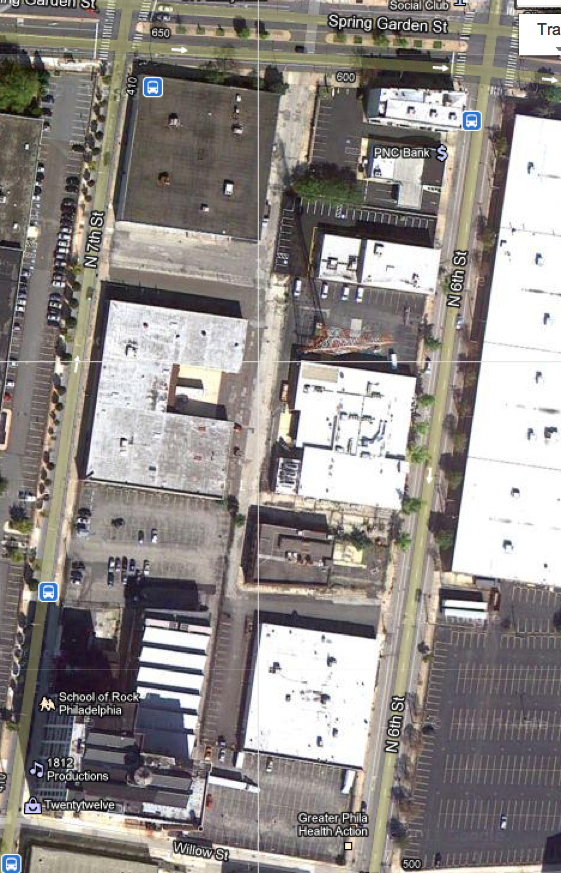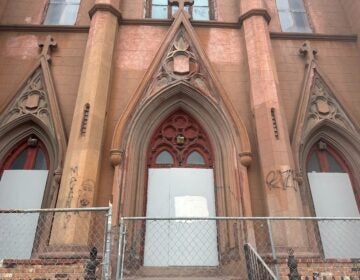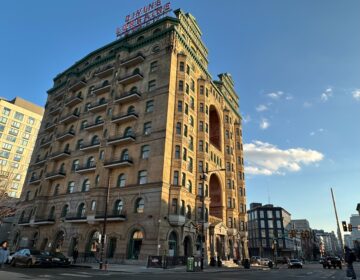City Council makes way for building wraps on Spring Garden Street

Update: Memo from the Law Department addressed to Mayor Nutter on risk of losing federal funding
By Kellie Patrick Gates and Jared Brey
For PlanPhilly
Philadelphia City Council Thursday passed a controversial bill that would allow building wrap advertisements of up to 10,000 square feet on part of Spring Garden Street. The signs could be digital, and could advertise things that are not on site.
The bill, introduced by outgoing First District Councilman Frank DiCicco, would allow these signs on buildings in the area bounded by 7th Street, Spring Garden Street, 6th Street and Willow Street , provided the building is not registered historic, not a parking garage, and meets certain size requirements. The sign also may not advertise tobacco or alcohol.
These boundaries surround “an area for entertainment and social gathering, including such businesses as the Electric Factory, J.D. McGillicuddy’s and various other Club uses” DiCicco wrote in the legislation. “Large ‘wall wrap displays’ on buildings can accentuate the vibrancy of an area and heighten the public’s sense of the area as a locus of entertainment, dining, retail and hospitality activities, and thereby attract more entertainment, shoppers and tourists,” the bill states, and wall wraps are “common to high density hospitality, entertainment and retail areas in many global cities.”
DiCicco’s reasoning echoes that which he gave for the creation of a Commercial Advertising District on East Market Street, between 7th and 13th streets, which City Council approved in June.
And just like that proposal, this one has critics.
SCRUB, the Society Created to Reduce Urban Blight, has been urging its supporters to email City Council or sign up to testify in opposition to the bill.
SCRUB says this part of the city was the site of a 2005 building wrap battle. A large wrap add went up and SCRUB fought it before the ZBA and through the courts, and eventually prevailed. The current legislation is an example of spot zoning, SCRUB leaders say, and also may violate provisions of the Federal Highway Beautification Act.
The signage would be visible from the Vine Street Expressway, Franklin Square Park and Independence Hall, SCRUB says in its email blast.
At Thursday’s Council meeting, only one person testified regarding the bill: Stephanie Kindt, a staff attorney at SCRUB. Kindt urged Council not to pass the bill, reminding Councilmembers that the Planning Commission recommended rejecting it, and that it could jeopardize outside funding. “If Council passes this bill,” Kindt said, “they’re putting at risk ten percent of 100 million dollars in state and federal funding that’s slated for state highway improvements. I would urge that before you vote, at least consider … what you’re putting at risk by passing legislation that would allow signage, this close to federal highways, of this size, at this location.”
In the end, the bill passed without the full support of all Councilmembers. Fourth-district Councilman Curtis Jones, Jr., was one of five Councilmembers to vote “nay” on DiCicco’s bill. Jones stopped short of calling the bill “spot zoning,” but said he withheld support for it out of respect for the Zoning Code Commission’s plan to overhaul sign controls over the next several months. “I thought the next big thing [the ZCC] is going to tackle was outdoor advertising,” Jones said. “So for this project to be singled out puts us in a position where we may be opening the door for others to use that as a precedent.”
He added, “I think I would respect the process by which many individuals volunteered their time over the last three years to talk about zoning in a comprehensive manner.”
At-Large Councilman Bill Green was part of the 12-person majority which supported DiCicco’s bill. He said outdoor advertising is a good way to bring money into the city, citing a report from freshmen City Councilmembers in 2008 recommending the use of wall-wrap signs. “I have no aesthetic or other serious objections to wraps,” Green added. “I think we need to do it as a citywide policy as opposed to on a particular property-by-property basis … but in general I have no objection to the proposition.”
Both the Philadelphia City Planning Commission and the Nutter administration were opposed to the bill. “We feel strongly that large format signs or building wraps should only be considered in conjunction with broader development goals and should not be granted to building owners on a case by case basis,” Deputy Mayor for Planning and Economic Development Alan Greenberger – who also chairs the PCPC – testified at an earlier hearing.
The administration had little comment on the bill Thursday. “We will review the legislation and our options,” Nutter spokesman Mark McDonald said in an email.
Nutter has the option of vetoing any legislation. However, he would have to find at least one more council member to side with him. The bill passed by a vote of 12 to 5; it takes 6 votes to sustain a mayoral veto.
Contact the reporter at kgates@planphilly.com
WHYY is your source for fact-based, in-depth journalism and information. As a nonprofit organization, we rely on financial support from readers like you. Please give today.





